Qihao Shi
Talos: Optimizing Top-$K$ Accuracy in Recommender Systems
Jan 27, 2026Abstract:Recommender systems (RS) aim to retrieve a small set of items that best match individual user preferences. Naturally, RS place primary emphasis on the quality of the Top-$K$ results rather than performance across the entire item set. However, estimating Top-$K$ accuracy (e.g., Precision@$K$, Recall@$K$) requires determining the ranking positions of items, which imposes substantial computational overhead and poses significant challenges for optimization. In addition, RS often suffer from distribution shifts due to evolving user preferences or data biases, further complicating the task. To address these issues, we propose Talos, a loss function that is specifically designed to optimize the Talos recommendation accuracy. Talos leverages a quantile technique that replaces the complex ranking-dependent operations into simpler comparisons between predicted scores and learned score thresholds. We further develop a sampling-based regression algorithm for efficient and accurate threshold estimation, and introduce a constraint term to maintain optimization stability by preventing score inflation. Additionally, we incorporate a tailored surrogate function to address discontinuity and enhance robustness against distribution shifts. Comprehensive theoretical analyzes and empirical experiments are conducted to demonstrate the effectiveness, efficiency, convergence, and distributional robustness of Talos. The code is available at https://github.com/cynthia-shengjia/WWW-2026-Talos.
Advancing Loss Functions in Recommender Systems: A Comparative Study with a Rényi Divergence-Based Solution
Jun 18, 2025Abstract:Loss functions play a pivotal role in optimizing recommendation models. Among various loss functions, Softmax Loss (SL) and Cosine Contrastive Loss (CCL) are particularly effective. Their theoretical connections and differences warrant in-depth exploration. This work conducts comprehensive analyses of these losses, yielding significant insights: 1) Common strengths -- both can be viewed as augmentations of traditional losses with Distributional Robust Optimization (DRO), enhancing robustness to distributional shifts; 2) Respective limitations -- stemming from their use of different distribution distance metrics in DRO optimization, SL exhibits high sensitivity to false negative instances, whereas CCL suffers from low data utilization. To address these limitations, this work proposes a new loss function, DrRL, which generalizes SL and CCL by leveraging R\'enyi-divergence in DRO optimization. DrRL incorporates the advantageous structures of both SL and CCL, and can be demonstrated to effectively mitigate their limitations. Extensive experiments have been conducted to validate the superiority of DrRL on both recommendation accuracy and robustness.
Distributionally Robust Graph-based Recommendation System
Feb 21, 2024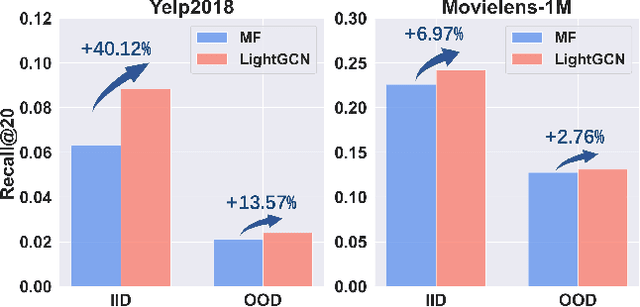

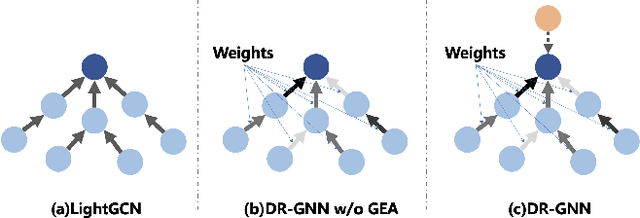
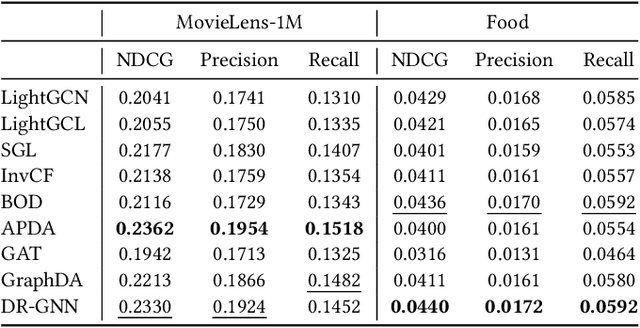
Abstract:With the capacity to capture high-order collaborative signals, Graph Neural Networks (GNNs) have emerged as powerful methods in Recommender Systems (RS). However, their efficacy often hinges on the assumption that training and testing data share the same distribution (a.k.a. IID assumption), and exhibits significant declines under distribution shifts. Distribution shifts commonly arises in RS, often attributed to the dynamic nature of user preferences or ubiquitous biases during data collection in RS. Despite its significance, researches on GNN-based recommendation against distribution shift are still sparse. To bridge this gap, we propose Distributionally Robust GNN (DR-GNN) that incorporates Distributional Robust Optimization (DRO) into the GNN-based recommendation. DR-GNN addresses two core challenges: 1) To enable DRO to cater to graph data intertwined with GNN, we reinterpret GNN as a graph smoothing regularizer, thereby facilitating the nuanced application of DRO; 2) Given the typically sparse nature of recommendation data, which might impede robust optimization, we introduce slight perturbations in the training distribution to expand its support. Notably, while DR-GNN involves complex optimization, it can be implemented easily and efficiently. Our extensive experiments validate the effectiveness of DR-GNN against three typical distribution shifts. The code is available at https://github.com/WANGBohaO-jpg/DR-GNN.
Jointly Complementary&Competitive Influence Maximization with Concurrent Ally-Boosting and Rival-Preventing
Feb 19, 2023



Abstract:In this paper, we propose a new influence spread model, namely, Complementary\&Competitive Independent Cascade (C$^2$IC) model. C$^2$IC model generalizes three well known influence model, i.e., influence boosting (IB) model, campaign oblivious (CO)IC model and the IC-N (IC model with negative opinions) model. This is the first model that considers both complementary and competitive influence spread comprehensively under multi-agent environment. Correspondingly, we propose the Complementary\&Competitive influence maximization (C$^2$IM) problem. Given an ally seed set and a rival seed set, the C$^2$IM problem aims to select a set of assistant nodes that can boost the ally spread and prevent the rival spread concurrently. We show the problem is NP-hard and can generalize the influence boosting problem and the influence blocking problem. With classifying the different cascade priorities into 4 cases by the monotonicity and submodularity (M\&S) holding conditions, we design 4 algorithms respectively, with theoretical approximation bounds provided. We conduct extensive experiments on real social networks and the experimental results demonstrate the effectiveness of the proposed algorithms. We hope this work can inspire abundant future exploration for constructing more generalized influence models that help streamline the works of this area.
Robust Sequence Networked Submodular Maximization
Dec 28, 2022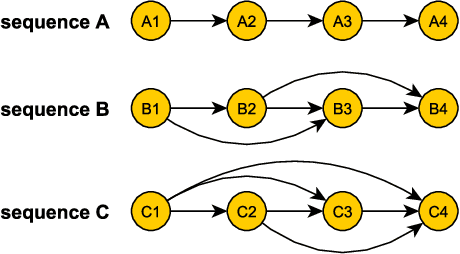

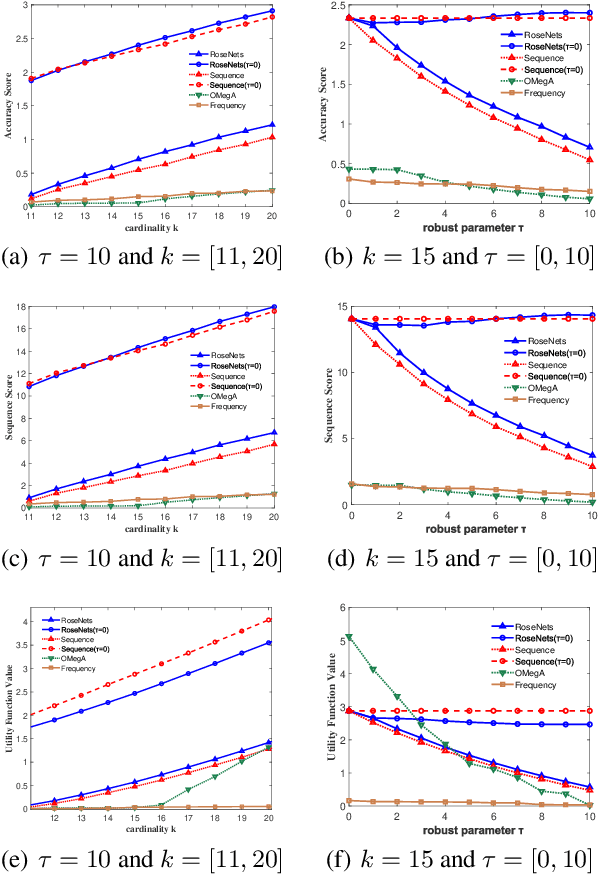
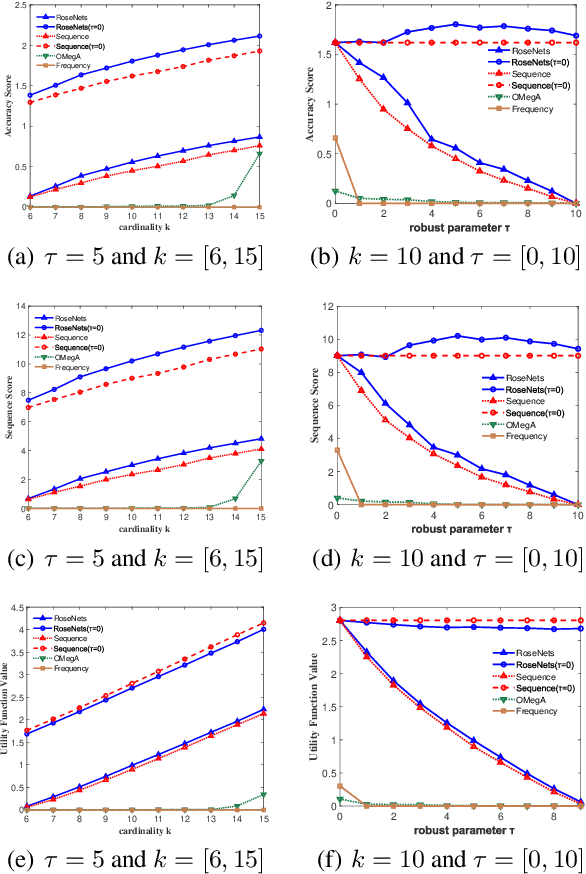
Abstract:In this paper, we study the \underline{R}obust \underline{o}ptimization for \underline{se}quence \underline{Net}worked \underline{s}ubmodular maximization (RoseNets) problem. We interweave the robust optimization with the sequence networked submodular maximization. The elements are connected by a directed acyclic graph and the objective function is not submodular on the elements but on the edges in the graph. Under such networked submodular scenario, the impact of removing an element from a sequence depends both on its position in the sequence and in the network. This makes the existing robust algorithms inapplicable. In this paper, we take the first step to study the RoseNets problem. We design a robust greedy algorithm, which is robust against the removal of an arbitrary subset of the selected elements. The approximation ratio of the algorithm depends both on the number of the removed elements and the network topology. We further conduct experiments on real applications of recommendation and link prediction. The experimental results demonstrate the effectiveness of the proposed algorithm.
Fast Adaptively Weighted Matrix Factorization for Recommendation with Implicit Feedback
Mar 04, 2020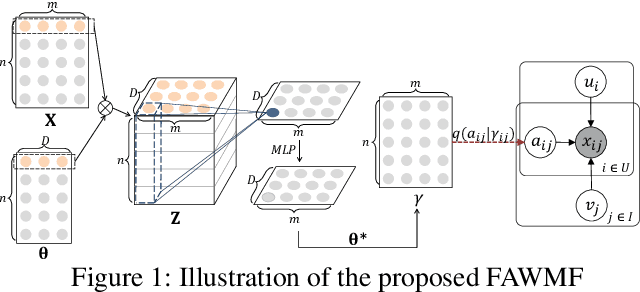

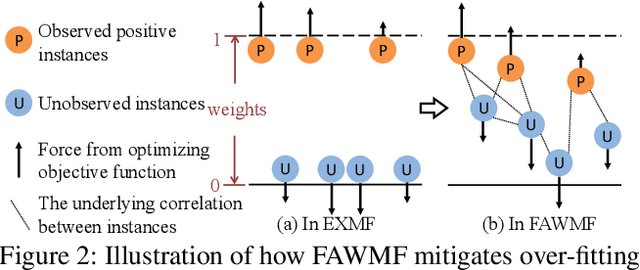
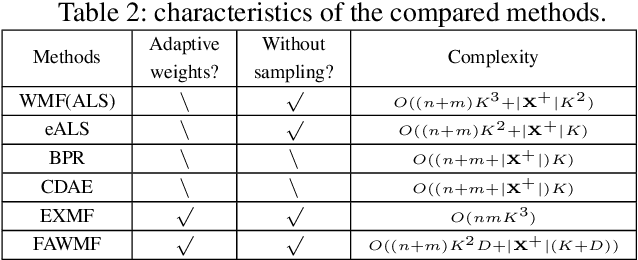
Abstract:Recommendation from implicit feedback is a highly challenging task due to the lack of the reliable observed negative data. A popular and effective approach for implicit recommendation is to treat unobserved data as negative but downweight their confidence. Naturally, how to assign confidence weights and how to handle the large number of the unobserved data are two key problems for implicit recommendation models. However, existing methods either pursuit fast learning by manually assigning simple confidence weights, which lacks flexibility and may create empirical bias in evaluating user's preference; or adaptively infer personalized confidence weights but suffer from low efficiency. To achieve both adaptive weights assignment and efficient model learning, we propose a fast adaptively weighted matrix factorization (FAWMF) based on variational auto-encoder. The personalized data confidence weights are adaptively assigned with a parameterized neural network (function) and the network can be inferred from the data. Further, to support fast and stable learning of FAWMF, a new specific batch-based learning algorithm fBGD has been developed, which trains on all feedback data but its complexity is linear to the number of observed data. Extensive experiments on real-world datasets demonstrate the superiority of the proposed FAWMF and its learning algorithm fBGD.
 Add to Chrome
Add to Chrome Add to Firefox
Add to Firefox Add to Edge
Add to Edge